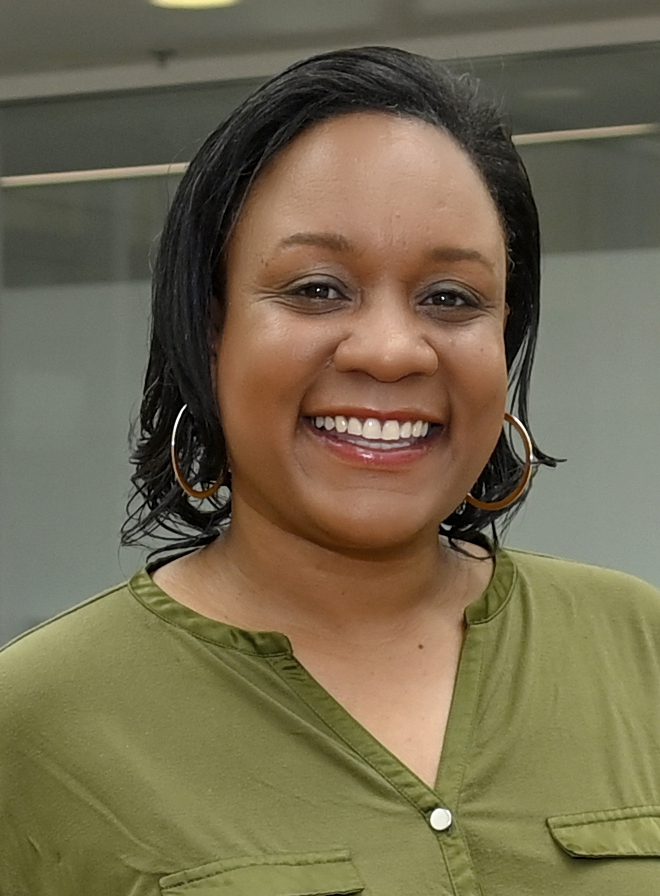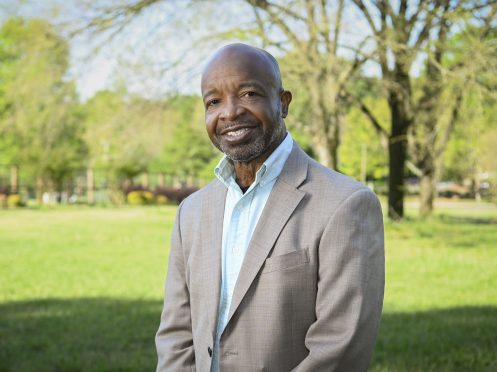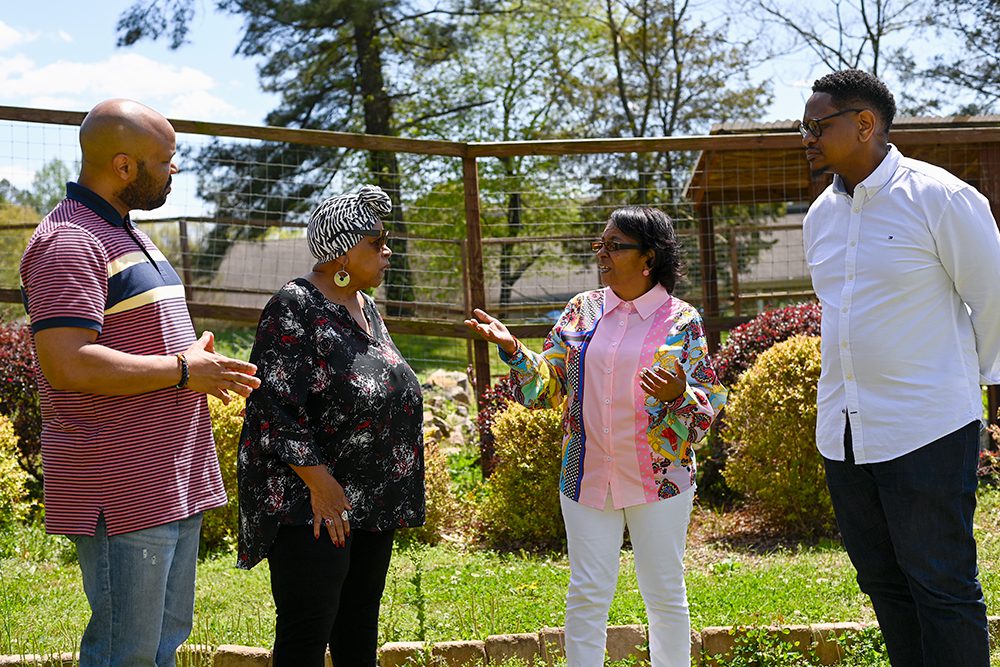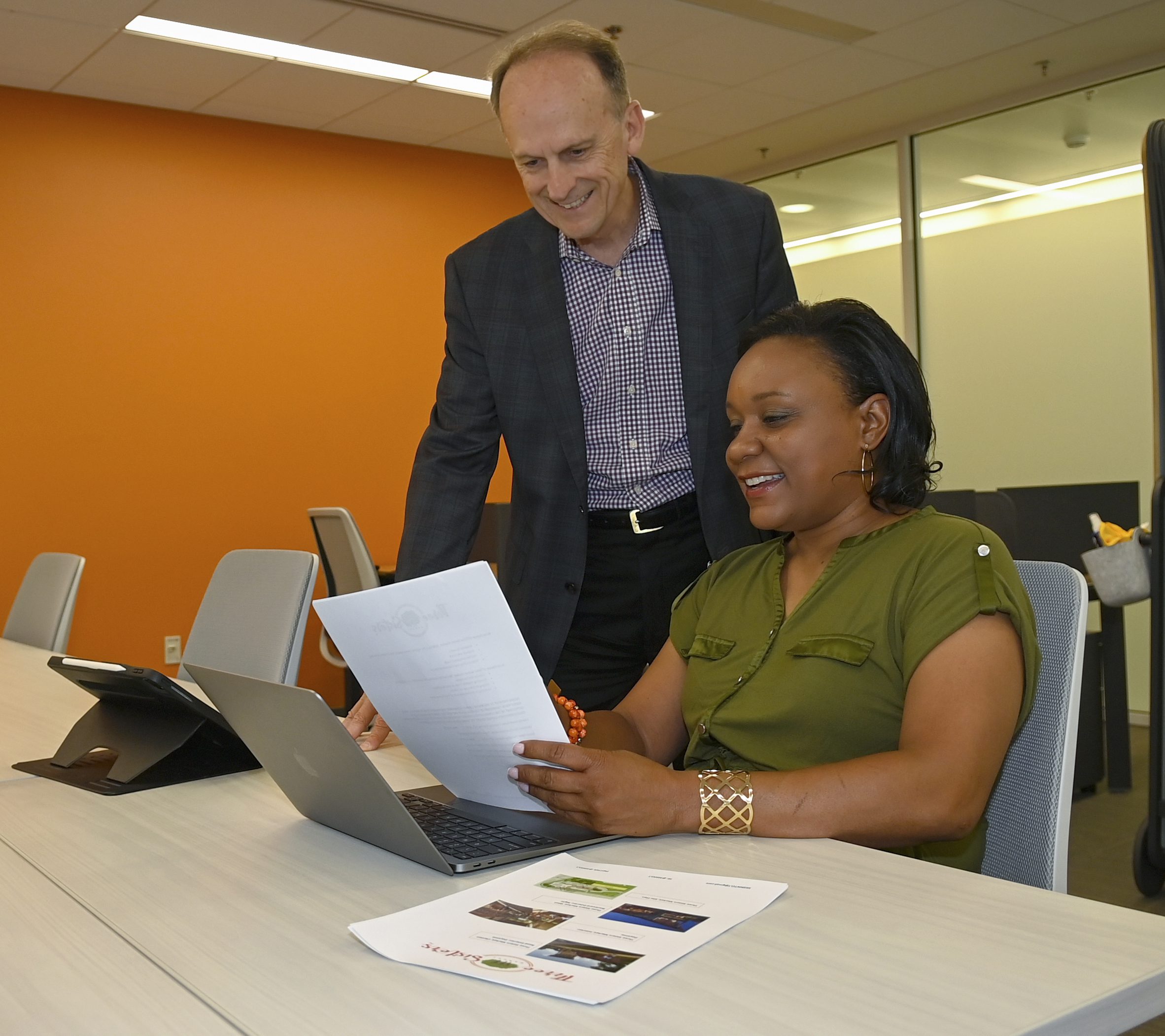Feeding the future
of West Boulevard
urbanCORE, UNC Charlotte’s hub for urban research and community engagement, led a 10-month participatory action research effort that catapulted public-private support to build The Three Sisters Market, a community-owned food cooperative in one of Charlotte’s most notable food deserts.
By Asha Ellison

When Janiqua Jackson left Tuscaloosa, Alabama, in 2023, she knew her life as a conventional grocer was over — there was a greater calling for her life. After more than 20 years of service and leadership in the grocery industry, her priorities and purpose had changed. Her passion to serve others, and her hunger for humanity would soon blossom in a new way.
The opportunity to lead a new initiative on Charlotte’s west side would move her back to the Queen City, a place she once lived, knew and loved. Plans to build a community-owned food cooperative in the West Boulevard corridor were underway for a community of neighborhoods that hadn’t seen a full-service grocery store since 1989. The Three Sisters Market would need a general manager who could not only bring previous food co-op experience to the project, but also someone who understood the community — and whom the community trusted.
When longtime community advocate and West Boulevard Neighborhood Coalition board chair Rickey Hall reached out to inform Jackson of the corridor’s need, she was inspired to answer the call.
“The work I do has to be meaningful and impactful,” Jackson said emphatically about her new role as general manager of the market. “It matters to me to help the community move forward; the people of West Boulevard deserve this market.”
LONG TIME COMING
Advocacy efforts to revitalize the West Boulevard corridor have been in progress for decades. From 1998 to 2019, a number of multimodal market studies and assessments initiated by the city of Charlotte and the West Boulevard Neighborhood Coalition pushed plans to prioritize the corridor’s needs. The area, home to nearly 15,000 residents in 2021, once grappled with a decline in safety, infrastructure and employment as well food insecurity and an overall unfavorable quality of life — but it never lost heart. Long-time community leaders and advocates champion West Boulevard’s revival as Charlotte’s economic boom moves closer to the corridor.
Even with a $20.9 million HOPE VI grant in 2009 from the U.S. Department of Housing and Urban Development to revitalize the neighborhood's Boulevard Homes as a mixed-income community that included plans for education and supportive services — now known as the Renaissance West Community Initiative — residents voiced their desire and a need to feed their families.
Although neighborhood leaders were on the ground steering engagement efforts, they were frequently met with resistance. The coalition needed support.

“From house to house, block to block, street to street, the cry of every neighborhood in the West Boulevard corridor was ‘we need a grocery store.’”
-Rickey Hall, West Boulevard Neighborhood Coalition board chair
In 2016, the West Boulevard community met with key players at the Stratford Richardson YMCA to further discuss the need for food access on the west side where it was determined that the best approach to mitigate West Boulevard’s economic and food challenges would lie in a collective solution. The idea to establish a food cooperative as the market model for the project moved to the conversation’s forefront.
The community-University connection
In 2021, a push from Mecklenburg County to tackle food insecurity led to a $272,000 investment to support urbanCORE’s inaugural Community Innovation Incubator, which took a closer look at the economic and social challenges facing Charlotte’s west side.
Under the leadership of Byron White, associate provost for urban research and community engagement at UNC Charlotte, a partnership between West Boulevard neighborhood residents and researchers from UNC Charlotte and Johnson C. Smith University studied, evaluated and co-produced recommendations for actionable solutions to the area’s ailments garnered $3.25 million from Mecklenburg County, $1.5 million from the Charlotte City Council and $750,000 from the U.S. Department of Housing and Urban Development. Additional advocacy from North Carolina Congresswoman Alma Adams advanced plans for a food cooperative.
Known as Three Sisters Market, the cooperative will cost approximately $10 million to complete and is currently raising the balance of funds through a capital campaign. It will boast 12,500 square feet of operational space at the corner of Clanton Road and West Boulevard on federal land managed by INLIVIAN, Charlotte’s housing authority. Slated to open in June 2025, the market will bring a full-service grocery store to the West Boulevard corridor for the first time in over 30 years, and it is expected to drive a positive economic shift for the community’s neighborhoods, infusing a sense of sovereignty, ownership, wealth-generation and long-term viability.

The Power of Participatory Action Research
"Collaboration serves members of the community by recognizing them as experiential experts who — with university researchers — share the opportunity to produce relevant solutions to the systemic challenges they face every day.”
- Byron White, associate provost, urbanCORE's.
For UNC Charlotte, Three Sisters Market will serve as a model of the positive community solutions that universities, engaged researchers and neighborhoods can produce when they work together. The market will be more than a grocery store for West Boulevard residents; it will be a community space and an innovation hub, a center for nutritional education, where they can learn about Black or African American food traditions and can use the community kitchen to create or expand food businesses, learn to cook healthy meals, experience art and more. Above all, it will be a place that feeds the community and helps to fuel its future.
"This is a strong community where people help each other however they can. They bring meals to those who are isolated and share rides when possible. But too many people have had to rely on fast food or convenience stores as their only available food options,” said Nadia Anderson, associate professor of architecture and urban design and director of the City.Building.Lab at UNC Charlotte. She and Colleen Hammelman, associate professor of geography and earth sciences, served on the faculty team that helped catalyze the co-op effort. Read More.
“The cooperative model gives residents a say in what the market provides and a way to become stakeholders such that wealth generated from the market stays in the neighborhood instead of accruing to a large corporation,” added Hammelman, who directs the Charlotte Action Research Project at UNC Charlotte.
ONGOING SUPPORT
As Jackson continues her work at the Three Sisters Market, she will continue to foster a relationship with urbanCORE to support engagement initiatives in and beyond the corridor. As a business partner of the University, she will have flexible operational space in the Partnership, Outreach and Research to Accelerate Learning building located at UNC Charlotte. Additionally, the University will support Three Sisters Market and Jackson as a pioneering business leader in the Charlotte region by providing access to a premier workspace and the Center for Innovation and Entrepreneurship, equipped with dynamic business resources to support the market’s growth and success from implementation to maturation — and to do it all while continuing to promote research and innovation.
The relationship among Janiqua, the Three Sisters Market and the University will be beneficial to everyone,” said Greg Needham, executive director of UNC Charlotte’s Office of Research Partnerships. “Not only will Janiqua be able to employ student workers, she will have the opportunity to collaborate with faculty for continued community research, especially in the arena of economic mobility and food insecurity.”

Three Sisters Market, as a University business partner, has office space in PORTAL;
Janiqua Jackson confers with Greg Needham, Office of Research Partnerships.
The Three Sisters Market will not be the last community-university solution to emerge from urbanCORE’s participatory action research projects. With its second Community Innovation Incubator underway in Charlotte’s West Sugar Creek community, the unit's incubator work, supported by Bank of America, will continue across across the remaining four of the city’s underinvested corridors of opportunity including the Albemarle/Central, Beatties Ford Road/Rozzelles Ferry, Freedom/Wilkinson and North Graham/North Tryon corridors.
Asha Ellison is director of research translation and engagement for the UNC Charlotte Urban Institute.